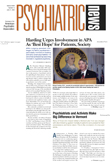In the survey reported in the February 1 article titled “M.D.s Go Beyond Data in Choosing Medications,” I believe it is no wonder that the private practitioners were exactly split over whether one antidepressant was better than others, because we, too, are confused by the few dozen academicians who are paid by the pharmaceutical industry to fly from one city to another and persuade us to make a certain brand of antidepressant our favorite while we consume a dinner of steak, salmon, wine, and salad. We defer to the message (as evidenced by the total eclipse of the TCAs) while being fully aware that there is no rhyme or reason (given our current stage of knowledge) as to why these sympathomimetic compounds work with one patient but not with another, although all of them work with a certain percentage of patients regardless of diagnosis—working best, of course, with those who have become unsympathetic to the general purpose of life (depressed).
I raise this issue because there is a wide misconception that by giving and attending such lectures—which unfortunately also form the backbone of the CME lecture circuit and where a few slides from the DSM are followed by the same old discussion on neurotransmitters and receptors and expressions of regret at the well-known side effects—one becomes proficient in the practice of psychiatry. Our entire research and educational system has also become a handmaiden to this format—then one laments why medical students are not interested in psychiatry.
Once psychiatry ceased seeing patient complaints as qualitatively meaningful communication (albeit in displacement), preferring to find the essence of mental illnesses in quantitative measurements, a movement that started in the 1950s with the introduction of rating scales and culminated with the birth of the DSM-III, this state of affairs was inevitable. However unscientific, soft-headed, woolly, eccentric, divergent, and contradictory the teaching used to be, there was more meat in the old-fashioned psychiatry than what the current academicians are feeding us. Now with nothing better to do, they saddle us with algorithms and treatment guidelines originating in the same narrow-minded format. God bless psychiatry!
It is high time that APA concentrated its energies on the massive overhauling of our “Greatest Show on Earth” (Psychiatric News, February 15) by inviting clinicians to present real cases and discuss how they treat patients psychologically (and this does not mean presenting data on the successes of CBT) and de-emphasizing the importance of statistically significant but practically useless studies. If psychiatrists do not stop their total devotion to correcting symptoms of mental illness on the molecular level without trying to understand patients’ (unconscious) psychological dimensions, it will not be long before our profession ceases to exist.
